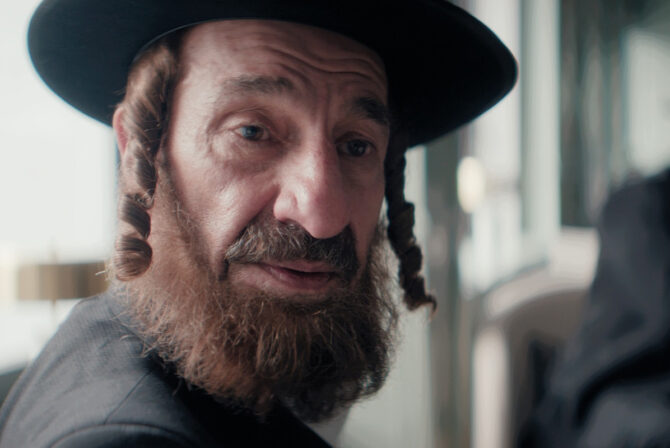This article originally appeared on www.InterfaithFamily.com and is reprinted with permission. For more resources designed for interfaith families exploring Jewish life, visit www.InterfaithFamily.com.
Anyone who’s ever been in a delivery room, or held an adopted child for the first time, knows that miracles do happen. Deciding what to name your own miracle can feel like an awesome choice, almost a second conception as you contemplate, Who shall my baby be? A Deborah? A Benjamin? A Moses?
Filled with overwhelming feelings of gratitude and wonder, new parents often turn to their religious traditions to find a way to name their unspeakable happiness and to announce it to the world.
For intermarried couples, the arrival of a baby may become the moment to decide “how we’re going to raise the kids.” Or if you have already decided to raise children in one faith or the other, this may be the moment to make that choice concrete and public. In any event, you have many options open to you.
Options for Welcoming Babies
Parents who have settled on raising their child as a Christian are usually affiliated with a church and can depend on the minister or priest for guidance in the christening and/or baptism (a ceremony that usually takes place in a church), though some families choose to have a less formal ritual at home.
For parents who have decided to raise children as Jews, the question of circumcision for sons is pressing, since the ritual is performed on the eighth day after birth–though it may be postponed if there is any question about the baby’s health. Boys are traditionally named at a brit milah (covenant of circumcision), which is better known by its Yiddish name, bris. (If the baby’s mother is not Jewish, there may also be a formal conversion of the child–a process that includes immersion in a ritual bath or mikveh, as well as circumcision.)
Baby-naming ceremonies for daughters are a relatively new phenomenon for American Jews. They vary a lot both in content and timing; some take place seven days after birth, others aren’t scheduled until the baby is a month or two old. Baby namings may be part of a synagogue service or held at home.
Announcing your decision about which religion your child will be raised in can stir powerful emotions in your extended families. Grandparents in particular may see your choice as a personal rejection of them and all their values. Christian family members may voice genuine concern over a child’s immortal soul if the parents forego baptism. Jewish parents may feel terribly guilty and ashamed.
While new parents should be unambiguous about this kind of decision, it’s important to be respectful and sensitive, too. Explain how and why you reached your decision. Reassure family members that your choice was not meant to hurt them, and that they will always be welcome in your home as well as beloved members of your baby’s family. Welcome both sides of the family to any ritual and/or ensuing celebration. (The New Jewish Baby Book contains many ritual options and chapters of special interest to intermarried families.)
Including Non-Jewish Relatives in Jewish Baby-Naming Rituals
 There are many ways to include non-Jewish family members in Jewish baby naming rituals. Typically, both parents do readings about the choice of the child’s name. Both sets of grandparents can be given ceremonial honors, such as carrying the baby into the room, and/or reading a poem or non-denominational prayer for the child.
There are many ways to include non-Jewish family members in Jewish baby naming rituals. Typically, both parents do readings about the choice of the child’s name. Both sets of grandparents can be given ceremonial honors, such as carrying the baby into the room, and/or reading a poem or non-denominational prayer for the child.
Parents who have decided to raise their child as a Jew can find congregational and rabbinic support for their decisions and help in planning a welcoming ceremony. (Remember that there are major differences among denominations: the Reform and Reconstructionist movements are most open to interfaith families, but some Conservative rabbis can be equally gracious and welcoming. It’s a good idea to do some advance “temple shopping” or even affiliate with a congregation if you’re clear about raising Jewish children.)
If non-Jewish family members are uncomfortable participating in the ceremony, don’t insist; perhaps they can make a toast at a meal that follows the baby naming.
Non-Denominational Baby-Naming Ceremonies
Intermarried parents have the option of creating their own namings or ceremonies of welcome. These can be virtually secular or they may invoke inclusive religious values and language by using readings from Song of Songs or Psalms, for example.
It’s a good idea to be clear about metaphors and symbols. Water rituals, in particular, can be confusing. For Christians, baptismal water is a sign of identification with the death and resurrection of Jesus and a symbol of welcome to the Christian community. Jewish baby ceremonies that use water (sometimes the baby’s hands and/or feet are washed, an echo of biblical scenes of welcome) signify the child’s entry into the Jewish covenant (brit) with God.
A non-denominational welcoming or naming ceremony might look something like this:
A Ceremony of Welcome
Guests gather in the living room with parents sitting in the front, or in the center of a circle.
Three candles can be set up on a central table. Each parent lights one candle and then, jointly, illuminates the third, explaining that this represents the new life in their family.
Both sets of grandparents carry the baby into the room and bring him/her to the parents, who announce the baby’s name and tell the story of how they chose it. (“She is named in memory of my grandmother Sarah, who was a strong woman, and in memory of Tim’s mother, Louise, a loving woman with a big heart.”)
If the baby is not fussy, family members and friends can pass him/her from person to person for a blessing. (“May you always enjoy good health.”)
Alternately, parents can hold the baby up to each guest–making “formal” introductions: (“Myra, I would like you meet my daughter, Sarah Louisa. Sarah Louisa, this is my oldest friend in the world, and now your auntie.”)
The friend might offer a “blessing.” (“Sarah, may you grow up to be as good a friend as your mother, and as fine a musician as your father.”)
Grandparents can be asked to do a reading.
Older siblings can participate in any age-appropriate way, which might include a reading or just giving the new baby a kiss.
After the ceremony, a festive meal brings everyone together to break bread and share the joy of the occasion.
(End of ceremony)
According to an ancient Jewish saying, “With each baby, the world begins anew.” The point of any ceremony or ritual is to give you, your family and your community a chance to share this hope for a fresh start.
Five Points to Consider:
1. New parents often feel the need to give public expression to the joy and awe of having a new baby.
2. Planning a baby naming may bring up emotional choices about your family’s religious identity.
3. If you decide to have a ceremony that is either Christian or Jewish, be sensitive to your extended family’s feelings, and find ways to include them in the celebration if not in the ceremony itself.
4. Intermarried couples who decide to raise their children as Jews may find this a good time to talk to a rabbi or even join a temple.
5. Non-denominational naming or welcoming ceremonies can be meaningful without invoking or excluding either family’s religious tradition.







